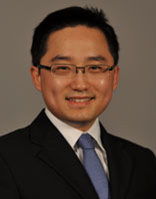 This conference was a great networking opportunity. As a cabinet member, I made connections with many of the panelists by working closely with them in the weeks leading to the conference. During lunch and in the networking session, attendees had the opportunity to talk to employees of leading pharmaceutical, biotechnology, medical devices, and consulting industries. It was also nice to meet other conference attendees from Darden and Kenan-Flagler.
This conference was a great networking opportunity. As a cabinet member, I made connections with many of the panelists by working closely with them in the weeks leading to the conference. During lunch and in the networking session, attendees had the opportunity to talk to employees of leading pharmaceutical, biotechnology, medical devices, and consulting industries. It was also nice to meet other conference attendees from Darden and Kenan-Flagler.
Prior to Fuqua, I worked in a lab at the National Institutes of Health. At that time, I developed an interest in the business of health care, and wanted to attend a few conferences in Washington D.C. to network and hear what leaders in the industry had to say. However, it was hard to find time during the work week, not to mention the high prices of admission these conferences usually had – especially for non-students! I decided to volunteer for these conferences and that experience moved me to apply for the Fuqua Health Care Club’s Conference Cabinet position when the term began.
The Fuqua Health Care Conference offered fabulous speakers. With the help of the Fuqua brand, its large alumni base in health care, and the connections of its faculty, we were able to bring in fantastic speakers. For the opening keynote, we had Jorge Bartolome, who is Senior Vice President at GlaxoSmithKline. Jeff Henderson, Chief Financial Officer of Cardinal Health, was our closing keynote.
We also had four panels that covered the leading healthcare topics of the day: Health Insurance Exchanges, Personalized Medicine, Electronic Health Records, and Biosimilars. Leaders from organizations such as Eli Lilly, Amgen, Deloitte, Blue Cross Blue Shield of North Carolina, GlaxoSmithKline, athenahealth, PricewaterhouseCoopers, and Duke Medical Center spoke on the panels.
I follow health care news faithfully but what I realized was that these panels offer insights that cannot be found in any publication. Our panel topics are all quite controversial, meaning there are no clear answers to any of these issues. That’s why it is so important to hear directly from the leaders in health care who are out there shaping the health care world. These speakers brought us to the forefront of what the health care industry in the US is dealing with today.
Another thing that made the Duke MBA Health Care Conference special was that it was student-run. In total, the student leadership team for the conference included 4 second-years and 8 first-years. One of my first jobs on the team was to develop questions for the panelists on the various panels. Not having much background in health insurance exchanges or electronic health records, I reached out to fellow first-years and received tons of support. Folks in health care are really passionate about the subject and I’m happy to be surrounded by many of them at Fuqua.
The Fuqua Health Care Club’s second year leadership really raised the bar for us first-years. They did an exceptional job in securing many of the speakers during the summer between their first and second year. Our faculty also provided critical support and played an instrumental role in the conference. As a first-year, I’m excited but also a little anxious for next year’s conference!
